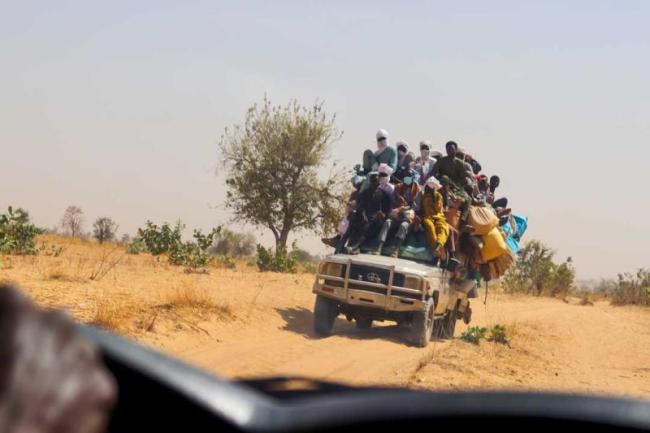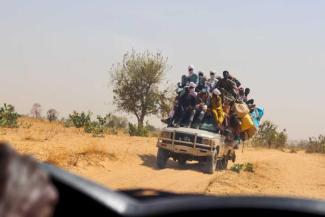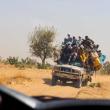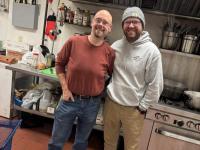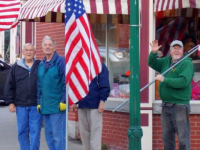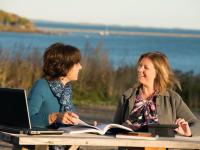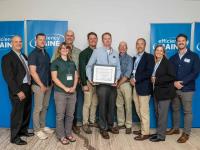Think before jumping into hot international waters.
The world is on fire. The war in Ukraine. Israeli hostages in Gaza. The humanitarian crisis in Gaza. Conflict and famine in Sudan. Gangs in Haiti. Starving children everywhere. Always starving children. And more.
More and more concerned people are jumping into the breach in the wake of the dismantling of USAID and the reduction of U.S. federal funding to international causes. I have personally witnessed this in our community as church groups, Rotary Clubs, and others seek ways to step up and help people in need. This desire to help those in need is part of our DNA as Americans. Alexis de Tocqueville noted this in his tome Democracy in America:
“Americans of all ages, all conditions, all minds constantly unite. … Americans use associations to give fetes, to found seminaries, to build inns, to raise churches, to distribute books, to send missionaries to the antipodes; in this manner they create hospitals, prisons, schools. Finally, if it is a question of bringing to light a truth or developing a sentiment with the support of a great example, they associate.”[1]
The art of Americans uniting to do good is powerful, particularly when the world is on fire. But it is absolutely imperative that we do our homework before we act internationally, lest we end up doing more harm than the good we intended. Here are some lessons learned from my work in this space to help people navigate the complexities associated with doing good in foreign lands.
1. Talk with people working and living in the impacted community before you act. When I worked with SOS Children’s Villages (an international charity that provides homes to orphaned and abandoned children in more than 130 countries and territories throughout the world), a devastating earthquake struck Haiti in 2010. The country was leveled. It is estimated that anywhere from 100,000 to over 315,000 people were killed. Families were ripped apart in the confusion, with many parents getting killed by cascading debris and young children staggering through unfamiliar streets trying to find their way home.
As the impact of the earthquake started garnering attention in the media, well-intentioned people started pouring into the country. Church groups and do-gooders with no experience in disaster relief or child reunification trolled the streets, looking for children they could help. For many of them, helping meant taking these children out of the country and resettling them in the United States. As was extensively covered in the media, one of the most notorious cases of such child trafficking involve ten Americans from an Idaho-based charity called “New Life Children’s Refuge,” which tried to remove 33 children from Haiti ranging in ages from two months to 12 years.[2] Members of the New Life Children’s Refuge believed that these children were orphaned. But these children did not have documents to prove that status, documentation that trained professionals issue after conducting due diligence.
SOS Children’s Villages had been working in Haiti since 1978 and had a wealth of experience in the country, employing people from the local population as expert service providers. The organization received significant media attention during the earthquake as it partnered with Angelina Jolie and the United Nations High Commission for Refugees to educate the world about the work it does to provide stable homes, in country, for children. If groups like New Life Children’s Refuge had performed just the most cursory of research before taking action, they would have found organizations like SOS and could have worked with us to protect children, rather than spending time in a jail in Port-au-Prince.
2. Don't skirt the law. Some Americans disagree with the U.S. government, its policy positions, and the laws it passes to protect our citizens. While the First Amendment grants us the right to speak against the government, we are still obligated to obey laws – and must be accountable for the choices we make.
In 2023, a New Hampshire-based organization that sent supplies to Syria pled guilty to three counts of failure to file export information. According to the IRS:
“Between 2018 and 2021, NuDay made over 100 shipments to Syria, a country that was subject to sanctions and export restrictions. NuDay had the items shipped to Mersin, Turkey, where another company would transship them into Syria. U.S. Department of Commerce regulations require exporters, such as NuDay, to report true and accurate information about the items being exported, including the shipment's description, end user, and monetary value. However, NuDay falsely reported that the end destination of the shipments was Turkey and not Syria, and artificially deflated the value of the goods to be below the $2,500 reporting threshold. For example, on May 5th, 2019, NuDay falsely reported that their shipment was intended for Turkey and that the value of the container was less than $2,500. NuDay now admits that this container was actually intended for Syria and claims its true value was $8.3 million.”[3]
While some might argue that the organization was not aware of the U.S. sanctions against Syria, the fact that it lied about the destination and value of the goods indicates that it willfully circumvented the law. This action not only thwarted U.S. policy aims, it violated the trust of volunteers and donors who wanted to help. Moral indignation about a situation does not give anyone the right to break the law. Doing so in a country that was sanctioned by the U.S. government for very good reasons does not give one the authority to act otherwise.
3. Don’t let help become a hinderance. Oftentimes, donors want to do more than write a check: they want to become involved and get a personal sense of what is happening. The most innocent version of this is when a food kitchen invites donors to serve meals on a holiday. I remember doing this when I was in college and the feeling it gave me was humbling. I can see why parents sometimes want this to be a family project. But in a crisis, the involvement of people who may be well-meaning but don’t know what they are doing can get in the way of first responders.
When Hurricane Katrina hit twenty years ago this week, I was working with a group of enthusiastic major donors who wanted to go into the region and help. While their hearts were in the right place, the problem was that this group would be competing with victims and first responders for clean water, food, bathroom facilities, limited road capacity, and a safe place to sleep. Even if we were to get them to the disaster site, they would need a guide and someone involved in the relief effort to explain what was going on – things that would take people away from saving victims and retrieving bodies. Giving donors a tactile impression of the disaster is important, but it has to take a second seat to those who are rendering help on the ground.
4. Know before you go. As Americans, we enjoy the freedom to make charitable donations, volunteer for organizations that share our values, and advocate for causes that are important to us. However, that freedom does not apply when we travel outside our borders. A blue passport does not protect you from the laws of a foreign country when you are there. Even if we “go with God” to help others in a foreign country, we are still obliged to understand what laws govern the U.S. relationship with the country we are visiting, the laws of the country we are visiting, and any political dynamics that could create counternarratives to our intentions. An American who makes a donation to charity in a war-torn country may be considered a humanitarian in the United States – but they also could be considered a terrorist if they travel to a nation in conflict with that war-torn country. Before you travel outside the United States, visit the U.S. State Department’s website for travel advisories (https://travel.state.gov/en/international-travel/travel-advisories.html) – even if you have traveled to that country before, as conditions are constantly changing.
To be clear, I’m not suggesting that Americans should not help those in need outside our country. What I am saying is that you should do your homework, don’t break the law, don’t get in the way, and do even more homework. The world needs good people to step up when there is a need, but they must do it responsibly.
[1] Daniel Stid, “Alexis de Tocqueville and the Art of Association,” AEI, March 5, 2025, https://www.aei.org/articles/alexis-de-tocqueville-and-the-art-of-association/
[2] “New Life Children’s Refuge Case,” Wikipedia entry, https://en.wikipedia.org/wiki/New_Life_Children%27s_Refuge_case
[3] “NuDay charity pleads guilty in connection with the illegal export of goods to Syria,” September 8, 2023, IRS website, https://www.irs.gov/compliance/criminal-investigation/nuday-charity-pleads-guilty-in-connection-with-the-illegal-export-of-goods-to-syria
About this blog:

Diane Lebson, CFRE, is CEO and Co-Founder of Evergreen Philanthropic Solutions, a Camden‑based consultancy that helps nonprofits in our community, throughout Maine, and across the country raise money and plan for their futures. She is also on the graduate faculty at the University of Maine's School of Policy and International Affairs where she teaches fundraising and nonprofit management. A member of the West Bay Rotary Club, Diane is the author of For A Good Cause: A Practical Guide to Giving Joyfully.


